Introduction
We live in a world where timing is everything and in business, delayed decisions cost money.
A campaign that launches too late. A stock that wasn’t reordered in time. A customer issue that wasn’t flagged fast enough. These are all problems that come from slow or incomplete data.
Businesses today need more than just data — they need clean, current, actionable data. This is where Data Processing Services come into play.
These services will do the heavy lifting for you by taking untidy, decentralized data from numerous locations and turning it into structured insights that your team can act on. Whether marketing teams need insight into campaign metrics or logistics teams want real-time views of deliveries, data processing is not just a back-office function anymore—it’s at the heart of how companies remain competitive, agile, and profitable.
Let’s unpack data processing, why it’s more critical than ever, and how savvy businesses leverage it to enable rapid, accurate decision-making.
What Are Data Processing Services?
Data Processing Services are the translator between the raw data and your business decisions.
Companies have access to large datasets from website traffic, customer behavior, sales transactions, inventory updates, support tickets, etc. However, raw data cannot be used as it is. It’s all over the place, it’s chaotic, it’s structurless, it’s usually not finished.
But that clutter has to be transformed into real usable insight — quickly enough to inform real-time decisions, and this is the job of Data Processing Services.
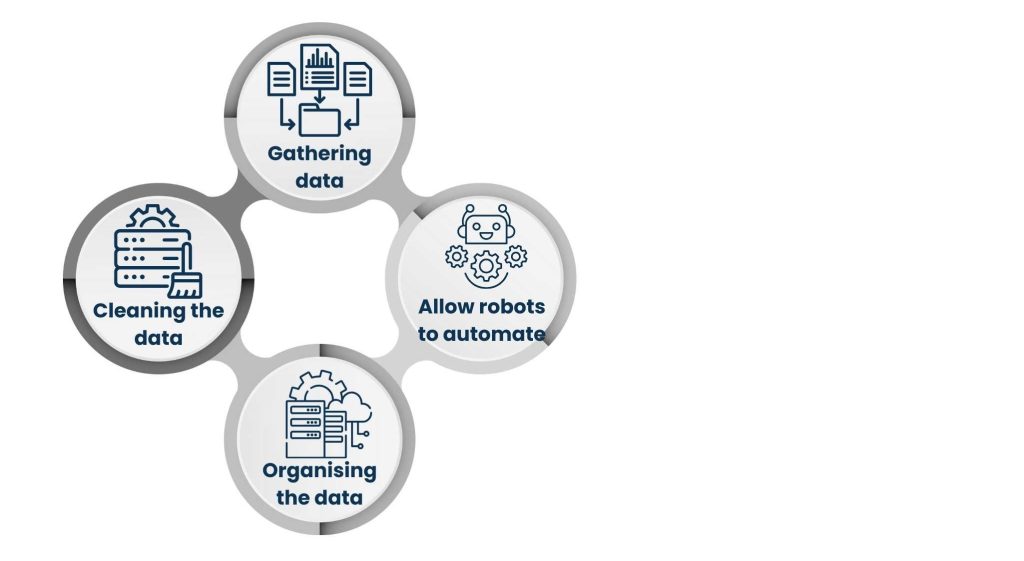
Here’s what they typically do:
1. Gathering data:
From every source (web, CRM, ERP, apps, third-party tools). This breaks down silos and creates a centralized data foundation. It chapter-izes firms and prevents teams from operating on misaligned information — a common source that causes misaligned decisions.
2. Cleaning the data:
Which involves removing duplicates, correcting errors and inconsistencies in formatting. If you skip this step, your reports may contain misleading or conflicting data points, making teams lose confidence in analytics.
3. Organising the data:
Into an actionable form — including tables, charts, reports, and real-time dashboards. Sales, marketing, finance — every department needs unique, readable views to take action fast.
4. Allow robots to automate:
The whole thing so you don’t get chained up to a screen updating spreadsheets manually. Automated data pipelines consistently deliver insights, freeing your team from redundancy and allowing them to focus directly on the execution.
Real-time triggers are insane with modern data processing — getting alerts when KPIs drop, when you hit thresholds, and when action is needed. This adds an agile, predictive layer that helps teams become more competitive.
The result? Instead of spending time organizing data, your team can use it to act, react, and stay ahead. And in today’s fast-paced market, that kind of agility is what sets businesses apart.
The Importance of Real-Time Data in Business
Here’s the truth: If your data is slow, your decisions are slow and in 2025, that’s a problem.
Real-time data lets your business stay agile and responsive. Whether it’s a customer making a complaint on social media or a sudden surge in product demand, you need systems that can help you respond in the moment not after the fact.
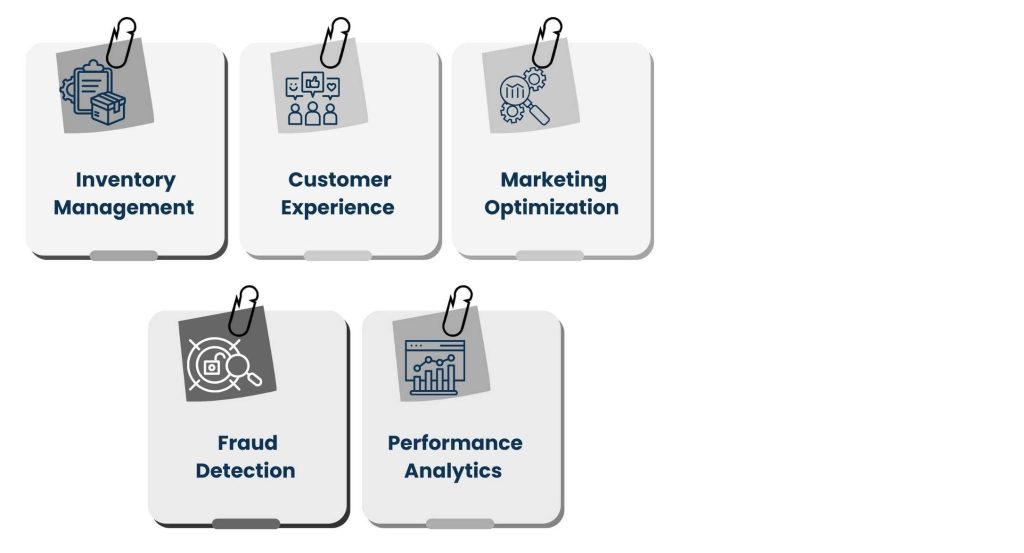
Let’s look at where real-time decision-making matters most:
1. Inventory Management: Real-time stock updates help prevent overselling or running out of product. It is crucial for e-commerce businesses, whether retail or wholesale.
2. Customer Experience: When a user takes a key action — like abandoning a cart or submitting a negative review — real-time data enables quick responses like triggered emails or alerts to support.
3. Marketing Optimization: Ad performance changes hour by hour. Real-time data allows teams to pause underperforming ads, shift budgets, or tweak creatives before money is wasted.
4. Fraud Detection: In fintech and e-commerce, real-time data helps flag suspicious transactions as they happen — not after the damage is done.
5. Performance Analytics: Dashboards that update in real time help leadership teams make decisions during meetings — not days later when reports are finally compiled.
Without real-time data, teams are either guessing, reacting too late, or spending hours cobbling reports together. And that’s not scalable.
Also Read: Virtual Assistant Services in Zaragoza
How Data Processing Services Power Real-Time Insights
How do Data Processing Services support real-time decision-making?
Let’s break down the process and know how each part contributes to better and faster business outcomes.
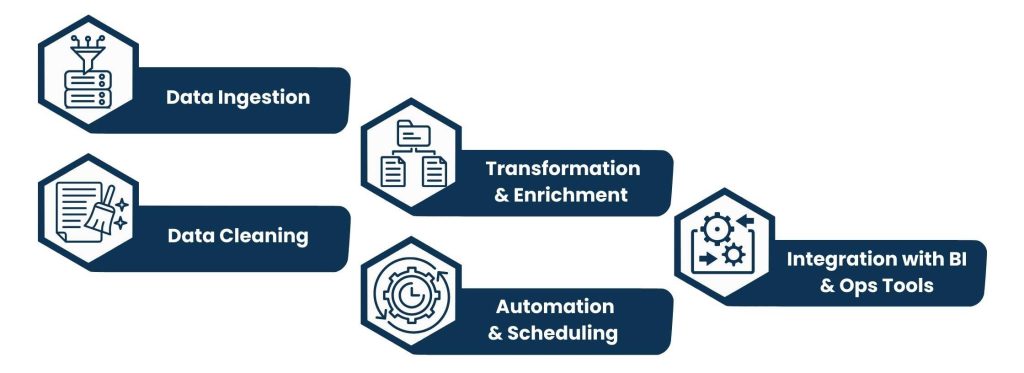
✅ Data Ingestion:
The first step is collecting data from multiple sources. This includes everything from customer forms, web analytics, CRM systems, POS data, IoT devices, social media, and more.
Why it matters: Without centralized collection, your data lives in silos. Ingesting it all in one place makes it accessible and usable in real-time — so decisions aren’t made based on partial or outdated information.
✅ Data Cleaning:
Once the data is collected, it’s rarely ready to use. There are duplicates, missing fields, inconsistencies in format, or irrelevant entries.
Why it matters: Dirty data leads to faulty insights. Cleaning ensures accuracy — so teams don’t waste time analyzing junk or making the wrong calls.
✅ Transformation & Enrichment:
This stage structures the data into a standardized, meaningful format — and often enriches it with context, like currency conversions, segment tags, or historical benchmarks.
Why it matters: Raw data isn’t decision-ready. Structured data helps identify trends, track KPIs, and generate insights that guide action.
✅ Automation & Scheduling:
Data processing services automate updates at fixed intervals or in real time, so dashboards and reports are always current without manual input.
Why it matters: No more emailing spreadsheets or chasing updates. Teams can trust the data they see and act on it quickly.
✅ Integration with BI & Ops Tools:
Clean, processed data is connected to tools like Power BI, Tableau, Google Data Studio, or CRM dashboards.
Why it matters: Your teams stay in their existing workflows and still benefit from real-time insights without switching platforms.
Together, these steps turn scattered information into a decision-making engine that supports every department — marketing, operations, finance, support, and leadership for almost all types of industries. Let’s know more about industries that rely on real-time data.
Industries That Rely on Real-Time Data
While real-time data helps nearly every business, here are five industries where Data Processing Services play a critical role in daily operations:
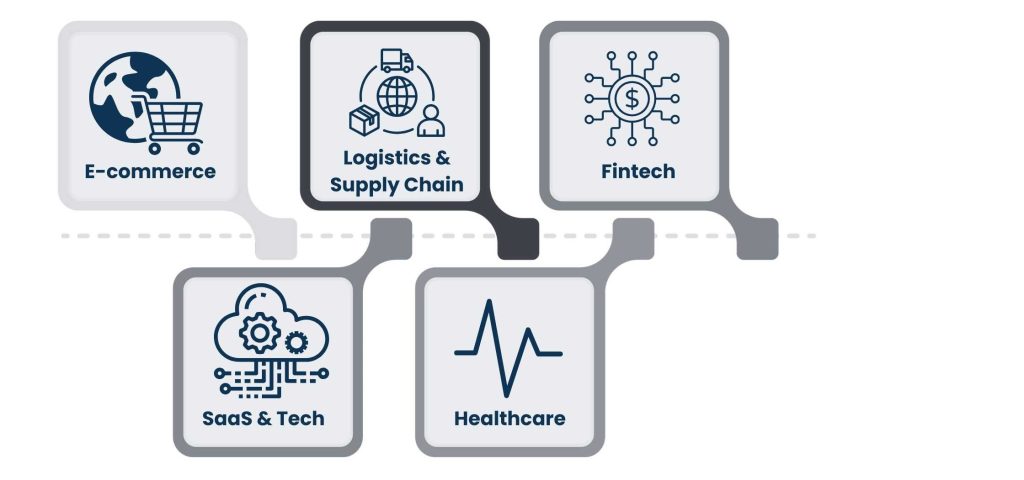
🛒 E-commerce:
Real-time product availability, customer behavior tracking, and promotion performance help teams personalize offers and avoid stockouts. Data processing ensures that everything from abandoned carts to fulfillment delays is tracked and addressed quickly.
🚚 Logistics & Supply Chain:
From shipment tracking to warehouse inventory, logistics teams use real-time data to route deliveries, avoid delays, and handle exceptions fast. Without clean data, packages get lost, and customers get frustrated.
💳 Fintech:
Whether it’s fraud detection or real-time loan approval, fintech companies rely on live data to serve users securely and efficiently. Even seconds of delay can lead to risk or lost conversions.
💻 SaaS & Tech:
Usage analytics, feature engagement, churn signals — SaaS businesses process product data in real time to improve onboarding, retain customers, and drive upsells.
🏥 Healthcare:
Patient data, appointment tracking, and treatment progress all need to be current especially in emergency care or telehealth. Real-time processing supports accurate care, reduces admin errors, and improves patient outcomes.
Below are some common mistakes that businesses usually make without reliable data.
Common Mistakes Businesses Make Without Reliable Data Ops
Even companies that have access to lots of data still make costly mistakes — not because they lack tools, but because their data operations aren’t set up to support speed or accuracy. Without proper Data Processing Services.
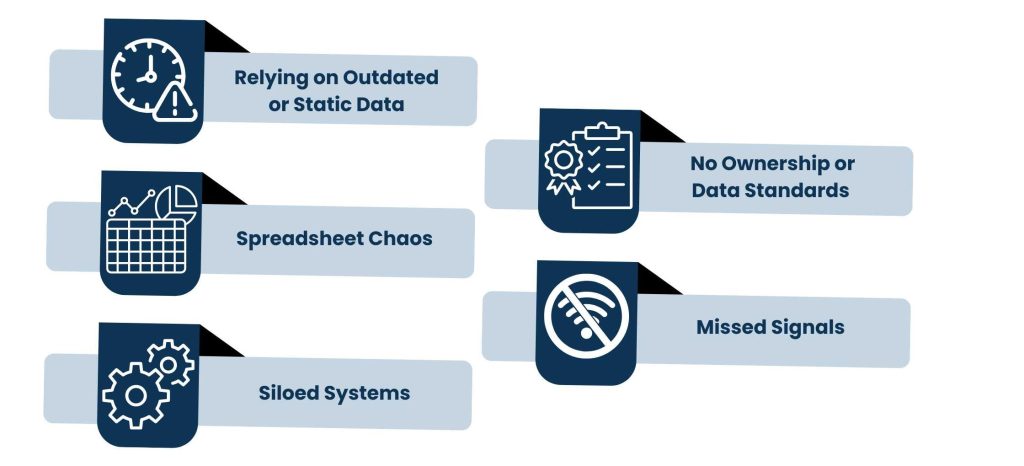
Here’s what usually goes wrong:
❌ Relying on Outdated or Static Data: Too many teams still run decisions off weekly or monthly reports. In today’s pace, that’s a liability. Delayed data means delayed action — and missed opportunities.
❌ Spreadsheet Chaos: Copying data between Excel files, manually updating KPIs, emailing CSVs around the team — these are signs of a broken process. Manual work leads to errors, version conflicts, and slow turnaround.
❌ Siloed Systems: If your CRM, analytics tool, sales reports, and customer support data don’t talk to each other, you’re only getting part of the picture. Integration is essential to see the full story and respond with confidence.
❌ No Ownership or Data Standards: When there’s no dedicated process for managing data flows, every team ends up doing things differently. That means inconsistent tagging, naming, and formatting — which makes reporting a nightmare.
❌ Missed Signals: Poorly managed data = missed churn warnings, broken product trends, or market signals that go unnoticed until it’s too late. Real-time data isn’t just faster — it’s sharper.
Also Read: Virtual Assistant Services in Sweden
What Better Data Processing Looks Like in Action

Let’s bring this to life with a simple before-and-after scenario:
Before: A marketing team runs Facebook and Google ads but waits a week for performance reports. Budget is still going to underperforming ads. Sales notice inventory is out only after orders pile up. Reporting is delayed, and by the time insights arrive, it’s too late to act.
After: With proper Data Processing Services, ad performance data is synced daily. Underperforming ads are paused same day. Inventory dashboards update in real time, triggering low-stock alerts. Decision-makers meet with up-to-date data, not last week’s report.
This is what operational clarity looks like — and why so many businesses are investing in better data workflows.
Conclusion
In business, speed + accuracy = competitive edge. In 2025, both will depend on how well your data is processed.
Data Processing Services aren’t just for big corporations — they’re for any business that wants to make faster, smarter decisions based on facts, not guesswork. When your data is clean, current, and connected, every team — from marketing to operations — becomes sharper, more confident, and more proactive.
Don’t let your insights get buried in broken spreadsheets or delayed dashboards. The businesses that move the fastest are the ones with the best data pipelines behind them.
And with the right support, you don’t need a massive tech team to make it happen.
About Us
Tasks Expert offers top-tier virtual assistant services from highly skilled professionals based in India. Our VAs handle a wide range of tasks, from part time personal assistant to specialized services like remote it support services, professional bookkeeping service etc. Furthermore, it helps businesses worldwide streamline operations and boost productivity.
Ready to elevate your business? Book a Call and let Tasks Expert take care of the rest.









